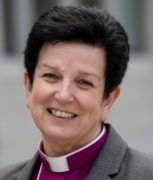We call today ‘Boxing Day’, but for the Church it is the ‘feast of Stephen’.
Stephen was the first Christian martyr, but even in the churches his day can slip our attention because like most people we are busy recovering from the activities of Christmas Day, and moving on into our usual Boxing Day business.
This day is remembered in a famous carol, one that tells a story from the life of a Duke of Bohemia eleven hundred years ago.
Good King Wenceslas looked out,
On the feast of Stephen,
When the snow lay round about,
Deep and crisp and even.
Brightly shone the moon that night,
Though the frost was cruel,
When a poor man came in sight,
Gathering winter fuel.
The carol tells this story of Wenceslas looking out from the comfort of his palace and noticing the plight of a poor man. He asks his page about the man and where he lives, and then the two of them, king and page go out into the snowy night to take meat and wine and logs to the home of the poor man.
The page does not get much choice about this, and the going is difficult, but they struggle through the winter storm together to do this act of kindness. The carol ends with the lines of encouragement to those who are singing:
Ye who now will bless the poor
Shall yourselves find blessing.
Now there are lots of stories about Wenceslas and his Christian kindness that are over a thousand years old, but this one was written in 1857, and set to a catchy tune known to the author. The carol is part of the Victorian re-invention of the Christmas season that followed the publication of ‘A Christmas Carol’.
So it comes from a time when some people were doing very well, and had an abundance at Christmas, but many were so poor that they had insufficient to live on, and certainly nothing for a celebration. The example that Wenceslas gave those who first sung this carol was that he was wealthy and comfortable, but he was not so taken up with himself and his own celebrations that he did not have the time first to notice someone who was struggling and then to do something about it.
In some ways it is easier for us today to notice the plight of those who are poorer. There are adverts on television and social media every day, though the whole year, which try to attract our attention so that we might give a small sum every month to charities that assist those who are struggling. We are encouraged to give to those providing clean water, charities offering health care, to those working with vulnerable children, and so on.
In fact, there are so many charities jostling for our attention that it can be that the easiest thing to do is blank them all out entirely. Each of us can decide what we want to give our attention to, and focus our charitable giving in that direction.
The carol about Wenceslas sets a different kind of example for us. The object of his Christian charity is not far away, but is instead a near neighbour for whom life is a struggle. The poor man lived just three miles from Wenceslas.
The carol suggests that if we look carefully, then we can see folk near to us who need assistance. Charity can indeed begin very close to home. It also shows how Wenceslas not only gave a gift that was helpful, but put himself out more than a little bit to make sure that all was well for the poor man on what was a feast day for everyone else.
So here is our example for Boxing Day. Let’s keep an eye out for our neighbours, in city, town or countryside, and do something practically helpful today. Let’s raise ourselves from the sofa and check on someone who lives nearby, but might not have a caller today. In the midst of our shopping for bargains, let’s notice those who are sleeping in doorways or begging by the shops, and buy them a coffee and a sandwich. We too can be a blessing on the feast of Stephen.
The Rt Rev Anne Dyer is Episcopalian Bishop of Aberdeen and Orkney and Scotland’s first female bishop

